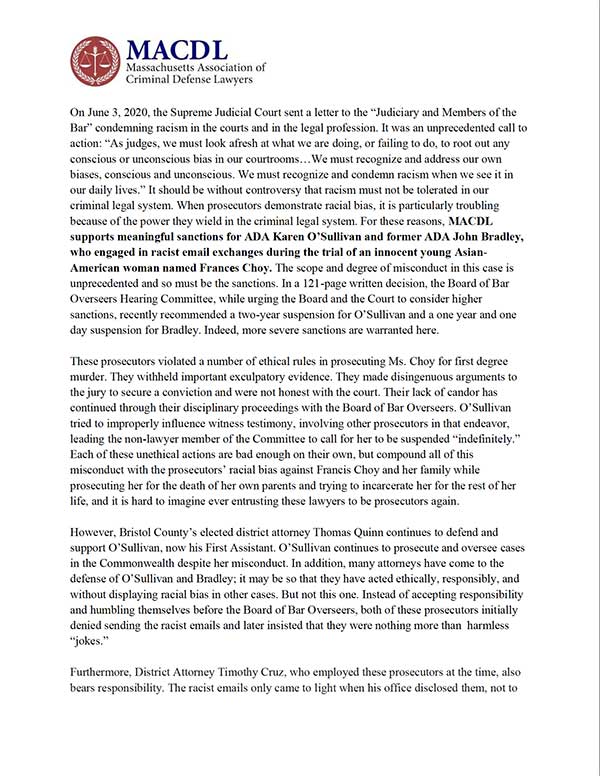On June 3, 2020, the Supreme Judicial Court sent a letter to the “Judiciary and Members of the Bar” condemning racism in the courts and in the legal profession. It was an unprecedented call to action: “As judges, we must look afresh at what we are doing, or failing to do, to root out any conscious or unconscious bias in our courtrooms…We must recognize and address our own biases, conscious and unconscious. We must recognize and condemn racism when we see it in our daily lives.” It should be without controversy that racism must not be tolerated in our criminal legal system. When prosecutors demonstrate racial bias, it is particularly troubling because of the power they wield in the criminal legal system. For these reasons, MACDL supports meaningful sanctions for ADA Karen O’Sullivan and former ADA John Bradley, who engaged in racist email exchanges during the trial of an innocent young Asian-American woman named Frances Choy. The scope and degree of misconduct in this case is unprecedented and so must be the sanctions. In a 121-page written decision, the Board of Bar Overseers Hearing Committee, while urging the Board and the Court to consider higher sanctions, recently recommended a two-year suspension for O’Sullivan and a one year and one day suspension for Bradley. Indeed, more severe sanctions are warranted here.
These prosecutors violated a number of ethical rules in prosecuting Ms. Choy for first degree murder. They withheld important exculpatory evidence. They made disingenuous arguments to the jury to secure a conviction and were not honest with the court. Their lack of candor has continued through their disciplinary proceedings with the Board of Bar Overseers. O’Sullivan tried to improperly influence witness testimony, involving other prosecutors in that endeavor, leading the non-lawyer member of the Committee to call for her to be suspended “indefinitely.” Each of these unethical actions are bad enough on their own, but compound all of this misconduct with the prosecutors’ racial bias against Francis Choy and her family while prosecuting her for the death of her own parents and trying to incarcerate her for the rest of her life, and it is hard to imagine ever entrusting these lawyers to be prosecutors again.
However, Bristol County’s elected district attorney Thomas Quinn continues to defend and support O’Sullivan, now his First Assistant. O’Sullivan continues to prosecute and oversee cases in the Commonwealth despite her misconduct. In addition, many attorneys have come to the defense of O’Sullivan and Bradley; it may be so that they have acted ethically, responsibly, and without displaying racial bias in other cases. But not this one. Instead of accepting responsibility and humbling themselves before the Board of Bar Overseers, both of these prosecutors initially denied sending the racist emails and later insisted that they were nothing more than harmless “jokes.”
Furthermore, District Attorney Timothy Cruz, who employed these prosecutors at the time, also bears responsibility. The racist emails only came to light when his office disclosed them, not to fulfill an obligation to provide exculpatory evidence or evidence of bias in Ms. Choy’s case, but in an attempt to discredit O’Sullivan during her testimony in another case. While his office ultimately assented to Ms. Choy’s request for a new trial and dismissed the charges against her resulting in her exoneration, this decision came only after Ms. Choy had endured 17 years of wrongful imprisonment (from age 17 to 34).
For too long, prosecutors have been unaccountable for conduct leading to wrongful convictions and the tragic loss of liberty and life. Where a court finds prosecutorial misconduct, it is not enough for the court to overturn the conviction and grant a motion for new trial. There must be personal and professional consequences for prosecutors whose misconduct undermines the integrity of the criminal legal system on such a fundamental level. Ideally, the consequences would come swiftly – it is shocking that a person whose integrity and judgment has been found lacking by two courts and a bar disciplinary panel is allowed to continue working as a public prosecutor – but regardless of delay, the unethical behavior cannot be forgotten or swept aside. Our country’s criminal legal system has a shameful history of racial injustice. We cannot tolerate racial bias permeating into this system and must do what we can to combat it. As our Supreme Court has said “racial bias [is] a familiar and recurring evil that, if left unaddressed, would risk systemic injury to the administration of justice.” Pena-Rodriguez v. Colorado, 580 U.S. 206, 224 (2017). The racial bias demonstrated by these prosecutors must be so addressed with sanctions that go beyond a temporary suspension of their ability to practice and prosecute.

